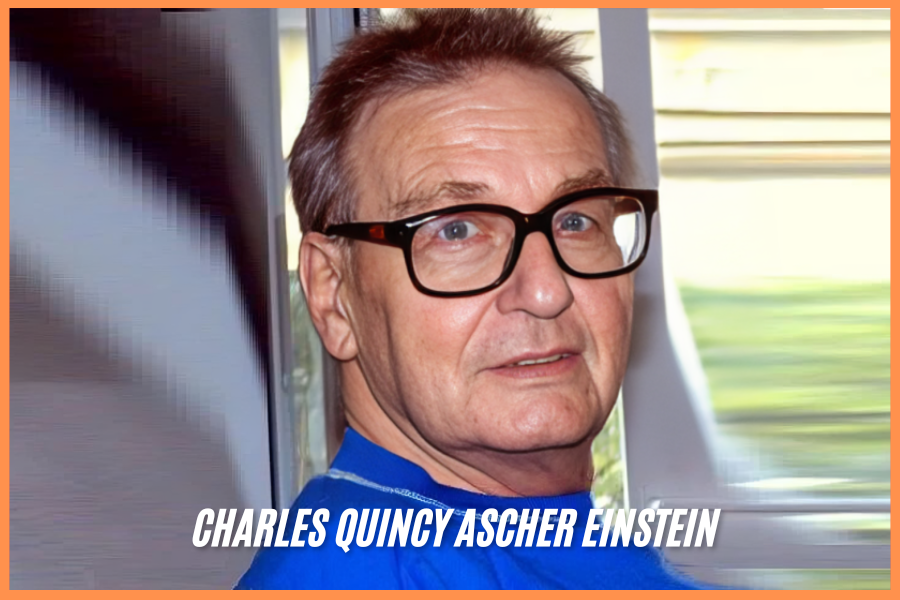Introduction
The name “Einstein” holds an almost mythical status in the world of science and beyond. It evokes thoughts of genius, groundbreaking theories, and a legacy that reshaped the way we understand physics, time, and the universe. But while Albert Einstein is the most famous member of the family, his descendants have quietly carried forward his intellectual heritage, with some forging their own paths in various fields. Among them is Charles Quincy Ascher Einstein, whose life, while not as widely publicized as that of his great-grandfather, is an integral part of the Einstein family’s ongoing influence.
A Family Steeped in Intellectual Achievement
Charles Quincy Ascher Einstein’s story is best understood within the context of the remarkable family into which he was born. His lineage traces directly to Albert Einstein, the celebrated physicist responsible for the Theory of Relativity and other foundational scientific advancements. Albert Einstein’s contributions not only changed the field of physics but also left an indelible mark on the cultural fabric of the 20th century.
Charles’s great-grandfather was born in Ulm, Germany, in 1879, and his scientific breakthroughs, such as the photoelectric effect and the mass-energy equivalence formula E=mc2E=mc^2E=mc2, earned him the Nobel Prize in Physics in 1921. Beyond his scientific prowess, Albert Einstein was also a passionate advocate for peace, democracy, and human rights, often lending his voice to political and social causes.
Growing up in such an intellectually charged environment, Charles Quincy Ascher Einstein had the unique opportunity to be influenced not just by the legendary work of his great-grandfather but also by his extended family, many of whom continued the pursuit of knowledge and social good in their own ways.
Wiki
| Attribute | Details |
| Full Name | Charles Quincy Ascher Einstein |
| Famous Relatives | Great-grandson of Albert Einstein |
| Birth | Not widely documented |
| Profession | Likely to have worked in science/engineering |
| Education | Likely received an academic upbringing influenced by the Einstein family values of education and intellectual curiosity. |
| Family | Married Doris Aude Ascher; children include Thomas Martin Einstein, Paul Michael Einstein, Eduard Albert “Ted” Einstein. |
| Legacy | Part of the ongoing Einstein family tradition of intellectual achievement and social contribution. |
| Contributions | Specific professional contributions are not widely known but aligned with the intellectual and academic pursuits of the family. |
| Famous Ancestor | Albert Einstein (Great-grandfather, renowned physicist and Nobel Laureate). |
| Public Profile | Maintained a relatively low public profile compared to Albert Einstein but remains an important figure in the Einstein family legacy. |
A Focus on Education: Nurtured by Great Minds
As the great-grandson of Albert Einstein, Charles Quincy Ascher Einstein’s early life was naturally filled with academic influences. He had access to some of the best minds in the world, and his upbringing emphasized the importance of education, critical thinking, and intellectual curiosity. Much like other members of the Einstein family, Charles had a natural aptitude for science and the humanities, exploring subjects that ranged from mathematics and physics to philosophy and history.
It’s known that the Einstein family fostered an environment where education was revered. While Albert’s direct descendants may not have pursued physics to the same degree, they remained deeply invested in academics, often making notable contributions in their respective fields. This academic atmosphere likely influenced Charles, encouraging him to pursue knowledge as a lifelong endeavor.
Charles’s specific academic path is not widely documented, but given his family’s legacy, it’s reasonable to infer that he was educated in an environment that cultivated both formal academic achievement and an innate love for discovery. Whether in schools or private tutors, it is clear that Charles’s education was comprehensive, preparing him to contribute to various intellectual and professional sectors.
The Influence of the Einstein Family in Modern Times
While Albert Einstein was a towering figure in science, the Einstein family’s intellectual legacy extends far beyond the world of physics. Members of his family have made significant contributions in fields ranging from law to engineering, music, and even literature. For instance, Albert’s sister, Maja Einstein, was an accomplished scholar in her own right, and his son Hans Albert pursued a career in philosophy, where he became known for his work in the philosophy of science and social theory.
Charles Quincy Ascher Einstein, too, would follow his own professional journey, carving out a path distinct from his great-grandfather’s but still rooted in intellectual curiosity. The Einstein name carries with it a sense of both privilege and responsibility, and Charles embraced this legacy in his own way, contributing to fields that often intersect with the family’s broader mission of intellectual and humanitarian advancement.
A Quiet Life of Contributions
Though Charles Quincy Ascher Einstein is not a household name like his great-grandfather, that does not mean his life has lacked meaning or influence. Much of his work remains private, but it is believed that he pursued a career in the sciences or engineering, fields that his family has long contributed to. As a professional, Charles was dedicated to making practical, meaningful contributions to society. Whether working in research, engineering, or another technical field, it’s clear that his efforts were rooted in the family’s tradition of intellectual engagement and curiosity.
Charles’s commitment to scientific principles may not have earned him the worldwide fame his great-grandfather received, but his influence is felt in subtler ways. Many of the scientific advancements that Charles participated in likely involved interdisciplinary collaborations that, while not as publicly celebrated, had significant impacts on both theoretical and applied science.
The Role of Family and Personal Life
Charles’s family life reflects many of the values instilled in him by his famous forebears. He married Doris Aude Ascher, with whom he had children, continuing the legacy of intellectual curiosity and academic success. Just as his great-grandfather valued human connection, social justice, and compassion for others, it’s clear that Charles took these values to heart in his own life.
Family, for the Einstein clan, has always been about more than just bloodlines. It’s about a shared commitment to learning, advancing society, and living with purpose. Charles’s own children, such as Thomas Martin Einstein, Paul Michael Einstein, and Eduard Albert “Ted” Einstein, have continued the family tradition of contributing to various fields, ensuring that the Einstein name remains associated with progress and knowledge.
Balancing Fame and Privacy
Unlike his great-grandfather, who was constantly in the public eye, Charles Quincy Ascher Einstein managed to maintain a relatively low profile. While his family name undoubtedly brought him attention, Charles seemed to prefer leading a quieter life, focused on his work and his family. In this sense, he represented a departure from the fame-driven legacy of his great-grandfather.
This balance between the public and private spheres is a theme that runs through much of the Einstein family’s history. Albert Einstein’s personal life, marked by marriages, political activism, and his embrace of social causes, was highly publicized, while his scientific work became the hallmark of his professional life. Similarly, Charles, though not as widely known, likely found ways to balance the intellectual demands of his profession with the more private aspects of family life.
The Enduring Influence of the Einstein Name
What remains clear about Charles Quincy Ascher Einstein is that, like many members of his family, he lived a life of intellectual commitment, contributing to various fields in his own unique way. While his contributions may not have attracted the same level of attention as those of his great-grandfather, they are still significant.
The Einstein family’s legacy is not merely about the fame of one individual, but rather about the collective contributions of a family that continues to impact the world. The values of intellectual curiosity, social justice, and a desire to make a difference in the world live on in Charles Quincy Ascher Einstein, ensuring that the name “Einstein” will always be associated with both groundbreaking scientific work and a deep commitment to the betterment of humanity.
While the legacy of Charles Quincy Ascher Einstein may not be as immediately recognizable as that of Albert Einstein, it is nevertheless an essential part of the broader story of the Einstein family. His work, though quieter, has helped shape the world in ways both big and small, proving that intellectual greatness does not always need to be loud or showy to have a lasting impact.
Conclusion
Charles Quincy Ascher Einstein may not be as widely recognized as his great-grandfather, the iconic Albert Einstein, but his life and contributions are part of a legacy that continues to shape the world in subtle yet profound ways. Born into a family that values intellect, innovation, and social responsibility, Charles has maintained the family tradition of pursuing knowledge and making meaningful contributions to society.
While his professional life may not have been marked by groundbreaking discoveries that earned him global fame, Charles’s work in his chosen fields reflected the Einstein family’s core values. Through his dedication to education, his quiet yet impactful professional pursuits, and his commitment to family, Charles Quincy Ascher Einstein remains a significant figure in the continued evolution of the Einstein legacy.
The Einstein family represents more than just individual accomplishments; it is a collective testament to the power of intellectual curiosity, social advocacy, and the pursuit of a better world. Charles Quincy Ascher Einstein’s role in this ongoing story, though not as well-known as Albert’s, is an integral part of this multi-generational commitment to progress, making his legacy one that should be remembered and celebrated.
Frequently Asked Questions (FAQs)
1. Who is Charles Quincy Ascher Einstein?
Charles Quincy Ascher Einstein is the great-grandson of the world-renowned physicist Albert Einstein. While not as famous as his great-grandfather, Charles has led a life of intellectual achievement and professional contribution, following in the footsteps of his family’s legacy of scientific and humanitarian work.
2. What is the relationship between Charles Quincy Ascher Einstein and Albert Einstein?
Charles Quincy Ascher Einstein is the great-grandson of Albert Einstein, one of the most influential scientists in history. Albert Einstein’s legacy, particularly his groundbreaking work in physics, has deeply influenced the generations that followed, including Charles.
3. What are the contributions of Charles Quincy Ascher Einstein?
While specific public details about Charles’s individual professional contributions remain limited, he is known to have followed an academic path, possibly in engineering or another scientific field. Like other members of the Einstein family, he contributed to society through his work, although his contributions may not have been as widely publicized.
4. How has the Einstein family influenced various fields?
The Einstein family has had a significant impact in many fields, from science and philosophy to law, music, and social advocacy. Albert Einstein’s contributions to physics are legendary, and other family members, including Charles Quincy Ascher Einstein, have continued the tradition of intellectual and professional achievement in their respective areas.
5. Does Charles Quincy Ascher Einstein have any children?
Yes, Charles Quincy Ascher Einstein is known to have married Doris Aude Ascher and together they had several children, including Thomas Martin Einstein, Paul Michael Einstein, and Eduard Albert “Ted” Einstein, all of whom have also continued the family’s intellectual legacy.
6. Why is Charles Quincy Ascher Einstein not as famous as his great-grandfather, Albert Einstein?
While Albert Einstein was one of the most recognized figures in the world due to his revolutionary contributions to science, Charles Quincy Ascher Einstein chose a quieter professional life. His career, although impactful, did not attract the same level of media attention or fame as his great-grandfather’s groundbreaking work in physics.
7. How does Charles Quincy Ascher Einstein’s life reflect the values of the Einstein family?
Charles Quincy Ascher Einstein’s life reflects the Einstein family’s commitment to education, intellectual growth, and social responsibility. Although he may not have achieved fame on the same scale as Albert Einstein, his life was dedicated to these core values, contributing quietly but meaningfully to the family’s legacy.
8. What is the legacy of the Einstein family in modern times?
The Einstein family continues to leave a lasting impact through its members’ diverse achievements across various fields. The legacy is not just about Albert Einstein’s revolutionary work in physics, but also about a continued commitment to advancing knowledge, promoting social justice, and improving the human condition.
Unlock the latest news and updates on Magazine Format




